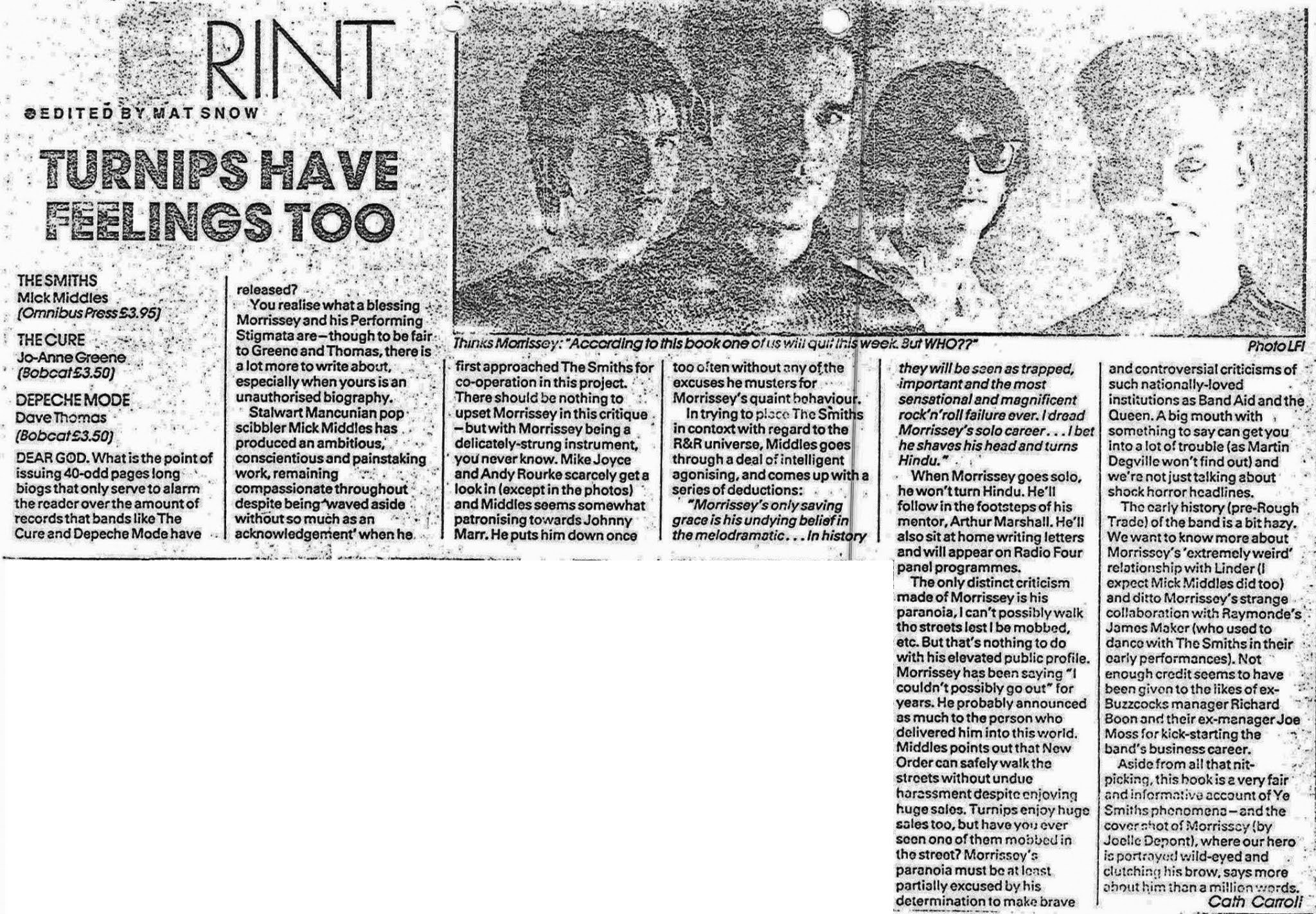Review of Mick Middles' "The Smiths" book
TURNIPS HAVE FEELINGS TOO
THE SMITHS
Mick Middles
(Omnibus Press £3.95)
THE CURE
Jo-Anne Greene
(Bobcat £3.50)
DEPECHE MODE
Dave Thomas
(Bobcat £3.50)
You realise what a blessing Morrissey and his Performing Stigmata are - though to be fair to Greene and Thomas, there is a lot more to write about, especially when yours is an unauthorised biography.
Stalwart Mancunian pop scribbler Mick Middles has produced an ambitious, conscientious and painstaking work, remaining compassionate throughout despite being 'waved aside without so much as an acknowledgement' when he first approached The Smiths for co-operation in this project. There should be nothing to upset Morrissey in this critique - but with Morrissey being a delicately-strung instrument you never know. Mike Joyce and Andy Rourke scarcely get a look in (except in the photos) and Middles seems somewhat patronising towards Johnny Marr. He puts him down once too often without any of the excuses he musters for Morrissey's quaint behaviour.
In trying to place The Smiths in context with regards to the R&R universe, Middles goes through a del of intelligent agonising, and comes up with a series of deductions:
"Morrissey's only saving grace is his undying belief in the melodramatic... in history they will be seen as trapped, important and the most sensational and magnificent rock'n'roll failure ever. I dread Morrissey's solo career. ..I bet he shaves his head and turns Hindu."
When Morrissey goes solo, he won't turn Hindu. He'll follow in the footsteps of his mentor, Arthur Marshall. He'll also sit at home writing letters and will appear on Radio Four panel programmes.
The only distinct criticism made of Morrissey is his paranoia, I can't possibly walk the streets lest I be mobbed, etc. But that's nothing to do with his elevated public profile. Morrissey has been saying "I couldn't possibly go out" for years. He probably announced as much to the person who delivered him into this world. Middles points out that New Order can safely walk the streets without undue harassment despite enjoying huge sales. Turnips enjoy huge sales too, but have you ever seen one of them mobbed in the street? Morrissey's paranoia must be at least partially excused by his determination to make brave and controversial criticisms of such nationally-loved institutions as Band Aid and the Queen. A big mouth with something to say can get you into a lot of trouble (as Martin Degville won't find out) and we're not just talking about shock horror headlines.
The early history (pre-Rough Tradc) of the band is a bit hazy. We want to know more about Morrissey's 'extremely weird' relationship with Linder (I expect Mick Middles did too) and ditto Morrissey's strange collaboration with Raymonde's James Maker (who used to dance with The Smiths in their early performances). Not enough credit seems to have been given to the likes of ex-Buzzcocks manager Richard Boon and their ex-manager Joe Moss for kick-starting the band's business career.
Aside from ail that nitpicking, this book is a very fair and informative account of Ye Smiths phonomena - and the cover shot of Morrissey (by Joelle Depont), where our hero is portrayed wild-eyed and clutching his brow, says more about him than a million words.
Cath Carroll

Comments
Post a Comment